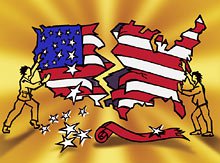Civics Unrest: On Teaching Kids to Love Democracy
With a presidential election on the horizon, teaching about our country takes on new importance.

I believe America is a verb, not a noun. America is the greatestopportunity for people to live in fairness and decency,but only if you accept the idea that America is an ongoingactivity, rather than a done deal. America as an evolvingconcept has meaning; our country offers more potential for humanfreedom and mobility of mind than any other sovereign nation createdin the last 10,000 years. But if America is just a noun, a staticobject, it should be treated as any other nation. Nothing special -- simply a place that is south of Canada and north of Mexico.
One of the fundamental tenets of our democracy is that we allowand share disparate opinions. That principle must be honored. If wedo not honor disparate opinions -- if we heap scorn and contempt onthose whose ideas differ from our own -- and if we humiliate dissentersfor exercising their right to dissent, we are being fundamentallyantidemocratic.
This is an important point to teach our children, and this is why itis critical that we continue to teach our children both civics and civildebate as a key part of our schools. If we no longer teach these skillsand we expect our children to inherit this great nation, it's like givingsomeone the keys to the car without requiring them to firstobtain the skills needed to drive.
The expertise needed to understand Western enlightenment andcivil liberties is not something you are born with. You have to learnit. Unless we teach our kids the ideas that make America -- the government -- a miracle, it will go away in their lifetime. We must findthe time and creativity to teach civics in school. If we don't, we willlose it to fundamentalists of every stripe and to stupidity and thedarkness.
A great example of this danger is our modern excuse for debate,particularly televised debate. We don't show that complex issuesrequire time to understand. We don't reason things through. Wedon't applaud rumination and taking your time.
Instead, we watch the Bill O'Reillys and Sean Hannitys and call itdiscourse. But is this really debate? Of course not. Politics and newshave been hijacked as mere sources of entertainment. We confusethe melodrama of incivility with how public issues are meant to bediscussed. Is this the way we want our children to behave: insulting,annoying, and loud? Is thissomething our kids shouldemulate? Instead, we need toteach our kids the tools of reason,logic, clarity, dissent,civility, and debate. We must teach them that it's OK to keep askingnew questions. Those things are the nonpartisan basis of democracy.
What has happened in America is that we have confused confrontationand opposition with discussion. We have turned debateinto entertainment. And we have created a system where dissent -- the essence of a democracy -- is considered antipatriotic, when in factthe opposite is the case.
Democracy is hard work. It requires our attention, because if wedon't use it, we lose it. Democracy will not go away in a single dramaticevent. No one will ever say that this is the day it died. But this is thestate of things now: Unless we are careful, America will turn into alegend, a story, a fable. All it takes is some inattention. It takes a beliefthat we don't count. It takes cynicism in our country. Cynicism isprobably the least attractive thing ever created, and it always comesfrom a broken heart. The only reason people get cynical is because oflove gone sour: At one time, there was an America we loved, and nowit's gone sour.
This country, the idea that we are responsible for our own government,represents a tiny twinkle of light in a long world history ofmonarchy and theocracy and oppressive darkness. If our form of representativedemocracy lasts longer than our lifetime or our kids' lifetime,it's only because we put some effort into teaching the ideals ofopportunity, mobility, freedom of thought, and assembly.
America in its imperfection may be unsatisfying, but it is alive. Andit is up to us to make sure America keeps on living. Kids must bereminded of the great parts of this country -- the parts that aren't always so easy to see orhear. Unless we give them something to fallin love with, why should they be in love?
Credit: Indigo Flores